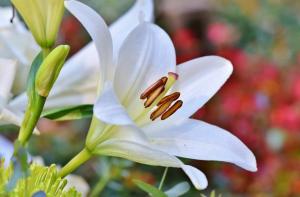I am working my way through my book A Year of Faith and Philosophy making revisions, adjustments, and additions to put it into final shape for submission to the editor and publisher in August. It is organized according to the lectuionary readings for each Sunday of the liturgical year. To give you a taste of what I am doing, here is the entry for the Eigth Sunday of Epiphany (I just finished the Epiphany chapter last week).
The Epiphany 8 Year A gospel reading concludes several consecutive Sundays immersed in the Sermon on the Mount. The text includes passages almost as familiar as the Beatitudes:
No one can serve two masters . . . You cannot serve God and wealth.
Look at the birds of the air; they neither sow nor reap nor gather into barns, and yet your heavenly Father feeds them.
 Consider the lilies of the field . . . they neither toil nor spin, yet even Solomon in all his glory was not clothed like one of these.
Consider the lilies of the field . . . they neither toil nor spin, yet even Solomon in all his glory was not clothed like one of these.
Do not worry about tomorrow, for tomorrow will bring worries of its own. Today’s trouble is enough for today.
Anne Lamott tells the story of an older woman in the midst of a twelve-step recovery program. One of the steps involved a lengthy and elaborate prayer about turning your life and expectations over to God, whatever or whomever you understand God to be. The woman revealed that instead of this elaborate prayer, she and some of the other older folks simply prayed “Whatever” upon waking, and “Oh, well” before going to sleep. This woman had internalized Jesus’ advice about worry and fear. Since we live in a world that is both frightening and largely out of our direct control, cultivating the habits of letting go and letting be is essential. As T. S. Eliot wrote in “Ash Wednesday,”
Teach us to care and not to care / Teach us to sit still.
The challenge of learning both to care and not to care should be familiar to persons of faith—this dynamic is woven throughout sacred texts. Jesus says to stop worrying about tomorrow, not because it will all work out for the best, but because today will provide us with enough to worry about. The beauty of the lilies that are more splendidly clothed than Solomon in all his glory is fragile and temporary. We are assured that God is aware when even a lowly sparrow falls from its nest, yet we are not assured that God is doing anything to keep the sparrow from falling in the first place. “Whatever” and “Oh, well” can sometimes take on a sacred meaning.
Fear and worry turn us inward; when Jesus invites us to consider the natural world around us—lilies, sparrows, growing crops, the wind—he is asking us to turn our attention toward things other than ourselves. When Jesus consistently challenges us to pay attention to the “least of these,” people falling through the cracks whose plight may seem distant from and unrelated to our own lives, he is calling us to full personhood. Iris Murdoch, who was an atheist, describes this dynamic in her essay “On ‘God’ and ‘Good’”:
Rilke said of Cezanne that he did not paint “I like it,” he painted “There it is.” One might say here that art is an excellent analogy of morals, or indeed that it is in this respect a case of morals. We cease to be in order to attend to the existence of something else, a natural object, a person in need.
The ebb and flow of human existence is inexorable, suggesting that there might be better strategies for coping than immediately descending into worry and fear over the daily events, great and small, that threaten to snuff out even our most basic hopes and dreams. Learn how to engage with things as they are rather than as I wish them to be. Remember that I am not, after all, the center of the universe. Do not stifle the beauty and promise of a day by insisting that everything is ultimately about me. These are the lessons of the birds and the lilies.
On those days when hope seems most distant, when the promise of things getting better sounds empty, consider this passage from the middle of the Book of Lamentations, perhaps the darkest text in the Jewish scriptures:
But this I call to mind, and therefore I have hope:
The steadfast love of the Lord never ceases, his mercies never come to an end;
They are new every morning; great is your faithfulness.
“The Lord is my portion,” says my soul, “therefore I will hope in him.”.
The Lord is good to those who wait for him, to the soul that seeks him.
It is good that one should wait quietly for the salvation of the Lord..
Or to put it differently, “whatever” and “oh well.”
For reflection: Once at a retreat the leader regularly said that the key to peace and centeredness is to “be where you are and do what you are doing.” How does this advice compare to Jesus’ advice to consider the lilies?












